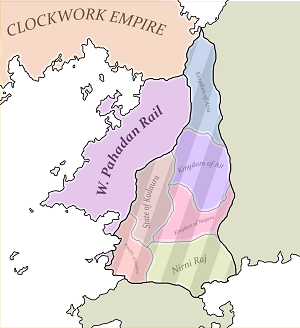West Pahadan Rail: Difference between revisions
No edit summary |
No edit summary |
||
| Line 22: | Line 22: | ||
|leader_title2 = [[Chairman of the Five Star Committee|Chairman]] | |leader_title2 = [[Chairman of the Five Star Committee|Chairman]] | ||
|leader_name2 = [[Liang Yating]] | |leader_name2 = [[Liang Yating]] | ||
|legislature = [[ | |legislature = [[Regional Unity Committee]] | ||
|sovereignty_type = Colonial Corporation | |sovereignty_type = Colonial Corporation | ||
|established_event1 = [[Korrukan Invasion of Khonsa]] | |established_event1 = [[Korrukan Invasion of Khonsa]] | ||
Revision as of 15:05, 10 May 2019
The West Pahadan Railway Company & The Automata Arms Corporation | |
|---|---|
|
Flag | |
Motto: 'Crown, Company, Commerce' | |
Anthem: Anthem of the Clockwork Empire | |
 WPR (purple), its vassals (striped) and the Clockwork Empire (orange) | |
| Capital and largest city | Nakashigawa |
| Official languages | Onghiri, Pahadan |
| Ethnic groups | Xian, Shihoki, Taebong, Zhuyeian, Sangam and Rukhanan |
| Demonym(s) | Korrukan |
| Government | Colonial Corporate Military Government |
• CEO | Zhang Xieren |
• Chairman | Liang Yating |
| Legislature | Regional Unity Committee |
| Colonial Corporation | |
| 1906 - 1910 | |
| 1910 | |
| 1912 | |
| 1912 - 1921 | |
| Population | |
• 1918 estimate | 38,912,331 (within WPR) 84,074,512 (within its vassals) |
• 1920 census | 122,986,843 |
| Currency | Clockwork Credit (CC) |
| Date format | dd.mm.yyyy CE |
| Driving side | right |
The West Pahadan Rail Company, officially called The West Pahadan Railway Company and Automata Arms Corporation and often referred to by the initialism of WPR, was a colonial corporate and military holding of the Clockwork Empire in Western Pahada. Spanning from the steppes of Tungnir to the tropical forests of central Pahada, the colonial holding was regarded as 'the most powerful company in the world', as it played an integral role in every aspect of civilian life within it.
It was formed on the onset of Clockwork's Second Initiative in an attempt to better accommodate Korrukan investment in the region, predominantly railways and telecommunication lines. Early into its operation it became a conglomeration with 'Automata Arms', an Imperial arms manufacturer that had defaulted on its debts.
Whilst its original and primary function was the operation of the railways and telecommunications, WPR soon came to dominate every aspect of civilian, military and economic life within its territories once noted military officer and Grand Commandant Zhang Xieren became CEO in 1912. During this period it underwent aggressive industrialisation of the Pahadan coast, its forced reallocation of ethnic groups, its ethnic colonisation and its conquest and control over numerous Pahadan states that would become its vassals.
WPR was noted for its own highly trained security force, its permitted status to control Imperial armies in the region, its aggressive campaign for Korukkan nationalism with its influence back at home and its disregard for international treaties against the Empire, which culminated in the company producing and operating its own maritime fleet.
